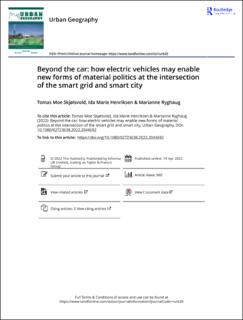Beyond the car: how electric vehicles may enable new forms of material politics at the intersection of the smart grid and smart city
Peer reviewed, Journal article
Published version
Permanent lenke
https://hdl.handle.net/11250/3054434Utgivelsesdato
2022Metadata
Vis full innførselSamlinger
Originalversjon
10.1080/02723638.2022.2044692Sammendrag
When large shares of electric vehicles are adopted, local electricity grids face new challenges associated with managing peak loads emerging from charging. Smart charging has been proposed as a way of addressing this challenge. To date, experiences of such combinations of technology mainly stem from pilot and demonstration projects, often organized as part of the research, innovation, and development initiatives. The paper explores local efforts to implement such technologies in four urban residential communities in Norway, where the technologies are needed for local electricity grids to keep up with the rapid uptake of electric vehicles. The authors study how the influx of electric vehicles enables new forms of material politics and new forms of engagement with the electricity grid. Their findings illustrate how the influx of EVs and the related response in urban residential communities often transforms very local democratic processes and actors into key sites and intermediaries of energy transitions. Through such processes, decisions are made about how to develop both the grid and the community through the mobilization of “smart” technologies. A further finding is that the influx of EVs might function as a conduit for the development of what the authors call electricity grid sensitivity.

